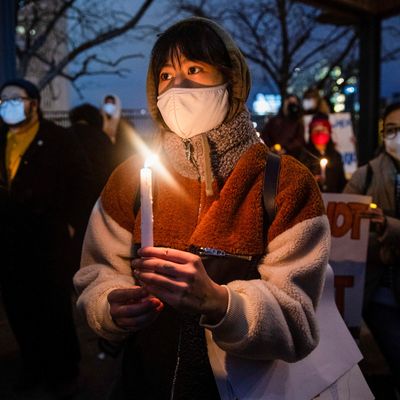
New York Is Committed to Providing Essential Coverage
We’ve removed our paywall from this and other stories about acts of violence and racism against Asian communities. Consider becoming a subscriber to support our journalists.
On August 24, 1874, 22 Chinese women were held on a ship in San Francisco’s harbor. They had papers, but when inspected by California’s immigration commissioner and found to be traveling without male companions, they were declared “lewd” and barred from entry unless the ship’s master paid an extortionate sum, which he refused. This was legal, said the Supreme Court of California, because the state had a right to block “a lewd and debauched woman,” though no evidence was presented that they were sex workers. The U.S. Supreme Court ruled the state had gone too far, but victory was short-lived. President Ulysses S. Grant told Congress of an “evil — the importation of Chinese women, but few of whom are brought to our shores to pursue honorable or useful occupations.” The Page Act, passed in 1875, barred such “importation” of women from “China, Japan, or any Oriental country” for “lewd and immoral purposes.”
Throughout the following century, American soldiers stationed across occupied Asia engaged in a sex trade that, as historian Robert Kramm has written, “reproduced racist stereotypes of the obedient and sexually available Asian woman”; he estimates that “in Tokyo alone, fifty to seventy thousand sex workers catered to predominantly American servicemen during the occupation period.” In postwar Korea, American patronage of Korean sex workers was so codified, it was a matter of geopolitics. According to one local organizer, “The U.S.–South Korean alliance depended on these comfort women.”
On Tuesday night, Robert Aaron Long, 21, told police he had killed eight people at three Atlanta-area massage spas. Per Captain Jay Baker of the Cherokee County Sheriff’s Office, Long also told officers there was no significance to the fact that six of his targets were Asian or Asian American women. “He does claim that it was not racially motivated,” Baker said. “He apparently has an issue, what he considers a sex addiction.” Long, he said, “sees these locations as a temptation for him that he wanted to eliminate.” (Baker also offered a bizarrely nonchalant and sympathetic account of the self-described mass murderer they had managed to apprehend alive: “He was pretty much fed up and had been kind of at the end of his rope, and yesterday was a really bad day for him and this is what he did.” The philosopher Kate Manne coined the term himpathy, the unearned empathy extended to men who commit misogynistic offenses, for days like this.)
There was already ample reason to take initial police accounts with a grain of salt — even before BuzzFeed reported that Baker had shared a racist shirt on Facebook that blamed China for the pandemic — but, as often happens, this uncritical recitation of a postarrest interview allowed the gunman’s words to define the narrative. Reuters initially headlined its piece “Sex addiction, not racial hatred, may have driven suspect in Georgia spa shootings: law enforcement.” As outrage built among a grieving Asian American community already grappling with a rise in hate crimes that have disproportionately singled out women, Reuters revised to a hedging acknowledgment: “Motive in Georgia spa shootings may not be race, but Asian-Americans fearful.” The updated headline wasn’t much better, implying that Asian Americans were overreacting or jumping to conclusions before all the facts were in.
It is true that there’s a lot we still don’t know about the crime and its victims. As of this writing, for example, there is no confirmation that the women he killed were sex workers. But even taken at face value, the statements from the man who has since been charged with eight counts of murder do not, in fact, exclude hatred. “He sees these locations as places he wanted to eliminate,” observes Jeannine Bell, a professor of law at Indiana University and an expert on policing and hate crimes. “Well, why does he want to eliminate them? Did he just select them? There are lots of places that focus on sex. Why did you happen to choose ones that are Asian?”
Long could be charged under Georgia’s hate-crimes statute, which was signed into law just last June, meaning that law enforcement and prosecutors don’t have much experience in using it. The law imposes minimum sentences — in the case of a felony, at least two years — if it can be determined beyond a reasonable doubt that the accused “intentionally selected” a target because of “actual or perceived race, color, religion, national origin, sex, sexual orientation, gender, mental disability, or physical disability.” Practically speaking, a two-year minimum sentence for a man who has confessed to the premeditated killing of eight people in a state that has the death penalty is unlikely to meaningfully affect his sentence.
But symbolically, it carries weight, says Bell: “To name it as a hate crime is an acknowledgment of the fact that horrible violence has been done to not just an individual but also to a group.”
The law’s focus on identifiable intention is probably why a police officer may place so much importance on the suspect’s own words, but it’s not the end of the inquiry. “A good investigator is going to go out there and interview everyone who was on the scene to see what he said,” said Mark Winton, a senior lecturer in the Department of Criminal Justice at the University of Central Florida who teaches a class to law enforcement on hate crimes. “They’re going to do a thorough background check, interview his family and friends, and they’re going to find out how he felt about women, how he felt about Asians, how he felt about sexuality.”
Interviewing people on the scene may make this a simple case. Local Korean-language media, translated by Congresswoman Marilyn Strickland’s staff, reported that an unnamed eyewitness said Long had uttered the words “Kill all Asians,” although, for reasons that are still unclear, this has not been picked up or independently confirmed by English-language outlets.
Still, such an explicit piece of evidence is not required to charge a hate crime. “The language of the statute doesn’t really require an expression of coherent hatred in order to find someone guilty,” says Boston University law professor Robert Tsai. Based on what had been reported as of Wednesday afternoon, Tsai mused that “the stronger argument at the moment appears to be that he selected his victims on the basis of sex.”
On paper, prosecutors would not have to choose between race and sex; they could look at Long’s actions holistically and select both. That doesn’t mean they will. “I know of no intersectional hate-crimes case,” says Bell. These are subtle and complex arguments, and “prosecutors like open-and-shut cases.”
Hate crimes themselves remain controversial. Some on the right believe they punish thought, while some on the left argue that they further criminalization and incarceration. Fredrick M. Lawrence, a distinguished lecturer at Georgetown Law School and the author of Punishing Hate: Bias Crimes Under American Law, supports these laws’ existence. “When you call a lynching a murder, you have not accurately described the crime,” he said. “The victim’s entire community understands what happened: It was an attack on all of them.” But on Wednesday, he pointed out that Georgia’s hate-crimes law requires that intent be proven beyond a reasonable doubt, and it remains to be seen if such evidence can be brought. “The criminal-justice system will always be an underinclusive tool,” he said. “It’s frustrating, but people look to the criminal-justice system to carry more weight than it can bear. In a free society, it will not solve every single social problem.”
The criminal-justice system may, in the end, interpret Long’s actions narrowly, either because of its own biases or because there isn’t enough evidence to convince a jury. In other realms of the law — discrimination in housing, voting, or employment — actions that disproportionately affect one group are understood as discriminatory, although violating these rules won’t put someone in prison or on death row. But the choices and methods of prosecutors need not be our own. “That the Asian women murdered yesterday were working highly vulnerable and low-wage jobs during an ongoing pandemic speaks directly to the compounding impacts of misogyny, structural violence, and white supremacy,” said Phi Nguyen, the litigation director at Asian Americans Advancing Justice in Atlanta. Just because a lawyer or a jury may not make a full accounting of these forces doesn’t mean the rest of us can’t do so ourselves.






























